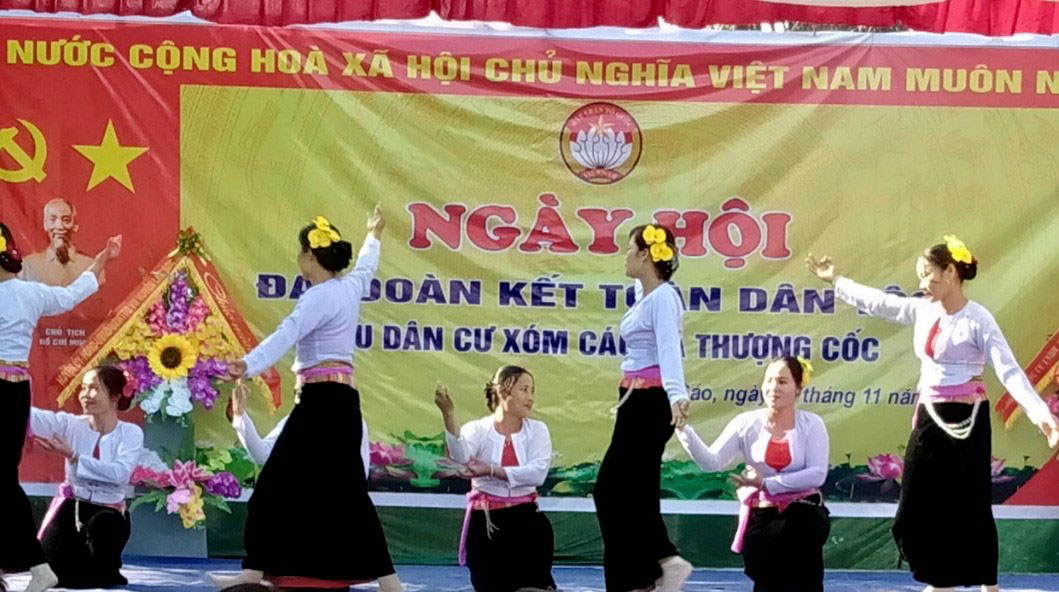
(HBO) – People in Thuong Coc commune, Lac Son district, Hoa Binh province, have raised the sense of self-consciousness and self-management through many models. According to Bui Van Khanh, Secretary of the communal Party Committee, thanks to creativeness and joint efforts, Thuong Coc has become a bright spot in the district in new-style rural area building.
 Through
self-management models, the material and spiritual life of residents in Cao
hamlet, Thuong Coc commune, Lac Son district, has been improved, contributing
to new-style rural area building.
Through
self-management models, the material and spiritual life of residents in Cao
hamlet, Thuong Coc commune, Lac Son district, has been improved, contributing
to new-style rural area building.
Among 98 households in Cao hamlet, the Muong ethnic minority group makes up
98 percent. Locals mainly earn their living through agriculture, while a
handful of them shifted to business. Last year, they self-financed the
installation of a lighting network, and tree planting along local roads,
covering nearly 600m.
They have also supported each other in building walls around their houses, thus
giving a facelift to the locality.
Such activities have been replicated in Me Com and Luong hamlets.
Since 2017 when the self-management model was
piloted, residential areas in Thuong Coc commune have overhauled their
communications work, encouraging locals to raise funds for the construction of
lighting systems.
The standing board of the communal fatherland front has joined hands with its
member organisations to popularise local self-management models at conferences
and meeting in the residential areas. Besides, it helps the residential areas
to evaluate the models, assess the roles of the fatherland front working group
in integrating self-management models, while promoting the models within the
families and residential areas.
To date, the commune has four outstanding models, including local residents
joining hands to build hygienic latrines, build fence and gate, lighten rural
roads, and develop inter-family self-management groups.
The model "Local people support one and others in building hygienic latrines”
has received enthusiastic response from households in all 14 residential areas
in the commune. Meanwhile the model to build fence and gate has been carried
out in six residential areas.
Forty-eight inter-family self-management groups have operated effectively in
all residential areas.
Bui Thi Quyen, head of Cao hamlet, said the models are practical for the
community since they create a facelift
to the residential areas while ensuring security and order in the locality.
The four models have been carried out in accordance with the campaign "the
whole people promote solidarity to build new-style rural areas”, contributing
to concretising advanced criteria of a new-style rural commune./.
Hoa Binh province is undergoing a dynamic transformation amid Vietnam’s national digital transition. Building on Poliburo’s Resolution No. 57-NQ/TW on breakthroughs in science, technology, innovation, and national digital transformation, the province has rolled out a wide range of practical action plans. A standout initiative is the "Digital Literacy for All” movement, an effort to ensure that no one is left behind in the digital era.
Hoa Binh province is undergoing a dynamic transformation in the wake of the national digital transformation movement. Building on Resolution No. 57-NQ/TW of the Politburo on breakthroughs in science, technology, innovation, and national digital transformation, the province has implemented a wide range of practical action plans. A standout initiative is the "Digital Literacy for All” movement ambitious effort to ensure that no one is left behind in the digital age.
With a spirit of unity and proactive problem-solving, the Party Committee, the government and the people of Dong Lai Commune (Tan Lac District) have made great strides in implementing the resolutions of the 24th Party Congress of the commune for the 2020 - 2025 term. Focusing on leadership and practical actions, the commune has brought the Party’s resolutions into daily life, creating strong impacts and pushing the local development forward.
Amid the nationwide push for digital transformation, young people in Hoa Binh Province are stepping up as dynamic pioneers, applying technology to enhance Youth Union operations and expand the reach of youth-led initiatives. Through creativity and adaptability, Youth Union organizations at all levels have introduced a series of practical solutions, contributing to modern governance and community development.
In recent years, An Nghia commune, located in Lac Son district, has stepped up administrative reform, focusing on improving the quality and efficiency of its single-window service unit for receiving and processing administrative procedures. These improvements have helped create favourable conditions for local residents and organisations to handle administrative procedures, contributing to the commune’s broader socio-economic development.
The Prime Minister-approved master plan to develop the multi-use value of forests ecosystems through 2030, with a vision to 2050, aims to improve the management and sustainable use of forest resources, create jobs, increase incomes, and improve the living standards of ethnic minorities, people in mountainous and remote areas, forest workers and those living near forests.



 Through
self-management models, the material and spiritual life of residents in Cao
hamlet, Thuong Coc commune, Lac Son district, has been improved, contributing
to new-style rural area building.
Through
self-management models, the material and spiritual life of residents in Cao
hamlet, Thuong Coc commune, Lac Son district, has been improved, contributing
to new-style rural area building.